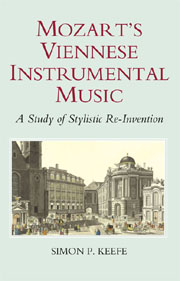Book contents
- Frontmatter
- Contents
- List of Musical Examples
- List of Figures
- For Celia, Abraham and Madeleine
- Acknowledgements
- Introduction: Mozart and Stylistic Re-Invention
- I PIANO CONCERTOS
- 1 ‘An Entirely Special Manner’: Mozart's Piano Concerto No. 14 in E♭, K. 449, and the Stylistic Implications of Confrontation
- 2 On the Grand, Brilliant and Intimate: Mozart's Piano Concertos K. 450 – K. 503 (1784–86)
- 3 A Complementary Pair: Stylistic Experimentation in Mozart's Final Piano Concertos, No. 26 in D, K. 537 (the ‘Coronation’), and No. 27 in Bb, K. 595
- II STRING QUARTETS
- III SYMPHONIES
- IV CONCLUSIONS
- Bibliography
- Index of Mozart's Works by Köchel Number
- Index of Mozart's Works by Genre
- General Index
1 - ‘An Entirely Special Manner’: Mozart's Piano Concerto No. 14 in E♭, K. 449, and the Stylistic Implications of Confrontation
from I - PIANO CONCERTOS
Published online by Cambridge University Press: 05 September 2013
- Frontmatter
- Contents
- List of Musical Examples
- List of Figures
- For Celia, Abraham and Madeleine
- Acknowledgements
- Introduction: Mozart and Stylistic Re-Invention
- I PIANO CONCERTOS
- 1 ‘An Entirely Special Manner’: Mozart's Piano Concerto No. 14 in E♭, K. 449, and the Stylistic Implications of Confrontation
- 2 On the Grand, Brilliant and Intimate: Mozart's Piano Concertos K. 450 – K. 503 (1784–86)
- 3 A Complementary Pair: Stylistic Experimentation in Mozart's Final Piano Concertos, No. 26 in D, K. 537 (the ‘Coronation’), and No. 27 in Bb, K. 595
- II STRING QUARTETS
- III SYMPHONIES
- IV CONCLUSIONS
- Bibliography
- Index of Mozart's Works by Köchel Number
- Index of Mozart's Works by Genre
- General Index
Summary
A HIGHPOINT in Mozart's career as a composer-performer in Vienna came rduring the spring of 1784. In a letter to his father Leopold, dated 4 March 1784, Mozart listed an astonishing 22 engagements for the period 26 February to 3 April, including three concerts in a subscription series at the Trattnerhof, two at the Burgtheater (one of which was subsequently cancelled) and several at the salons of Prince Galitsin and Count Esterházy. According to Mozart, the Trattnerhof and Burgtheater performances were particularly well received: he ‘won extraordinary applause’, had a hall that was ‘full to overflowing’ and was praised repeatedly for the first subscription concert on 17 March. He described the Burgtheater concert – for which he performed the Piano Concertos Nos. 15 and 16 in Bband D, K. 450 and 451 and the Quintet for Piano and Winds, K. 452 – as ‘most successful’ and remarked that it was ‘greatly to my credit that my listeners never got tired’. Even if Mozart can hardly be relied upon as an impartial witness to his own success, his list of subscribers to the Trattnerhof series, containing 176 names (‘thirty more than Richter and Fischer together’), many from the highest artistic, intellectual, cultural and aristocratic echelons of society, testifies to the high regard in which he was held. The Wunderkind who had charmed the Viennese in his youth had become a fully endorsed member of the Viennese musical establishment.
- Type
- Chapter
- Information
- Mozart's Viennese Instrumental MusicA Study of Stylistic Re-Invention, pp. 19 - 42Publisher: Boydell & BrewerPrint publication year: 2007



